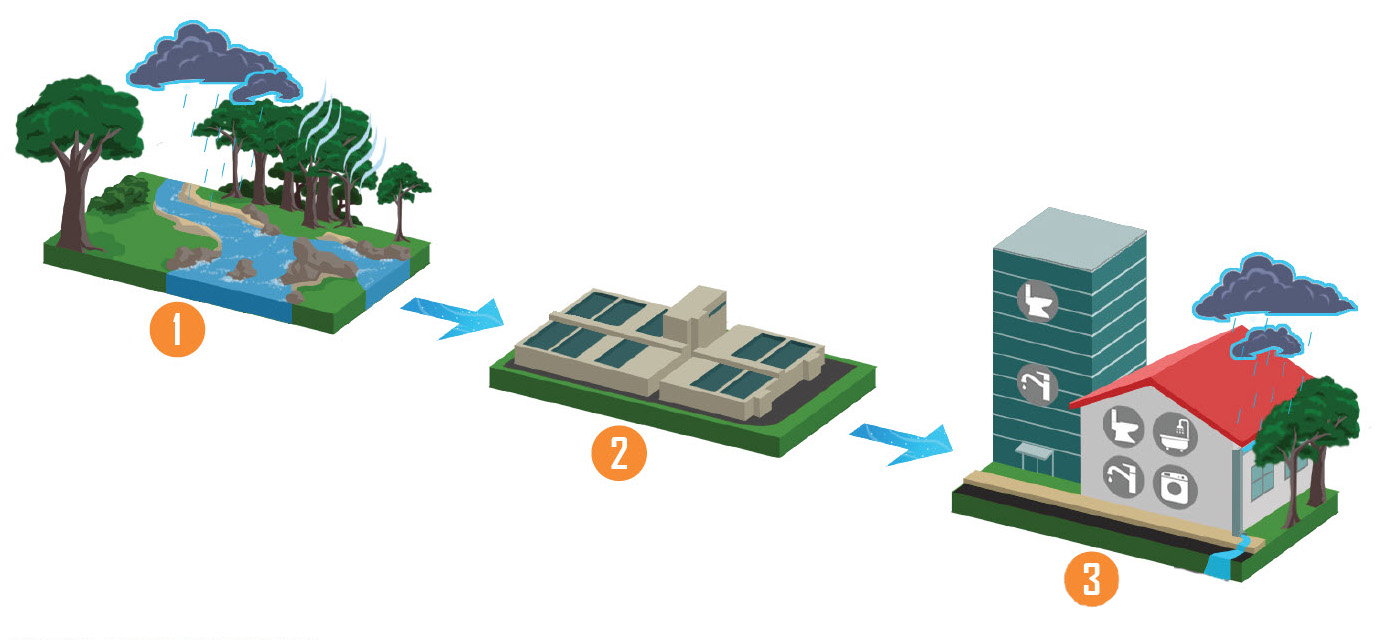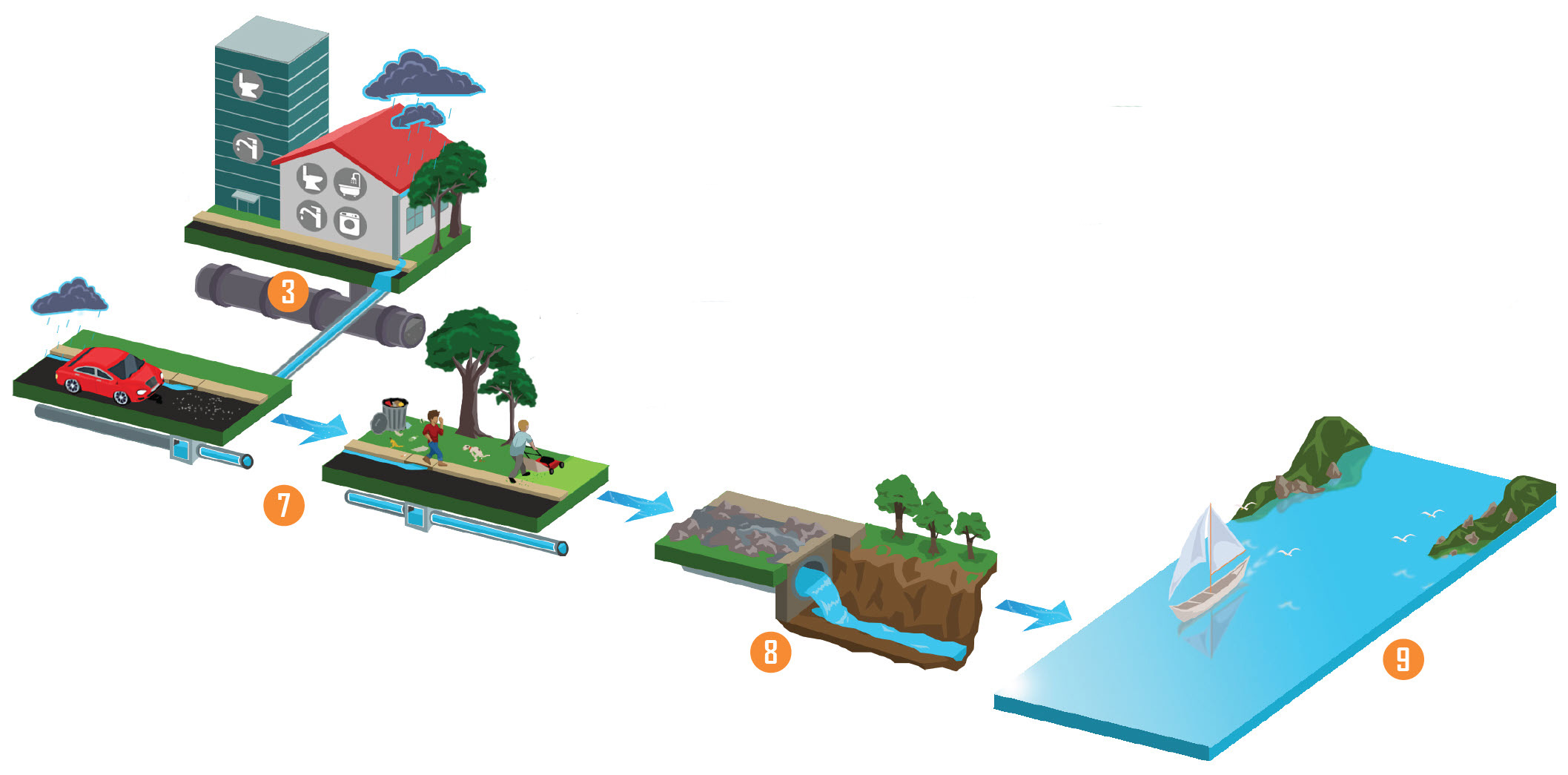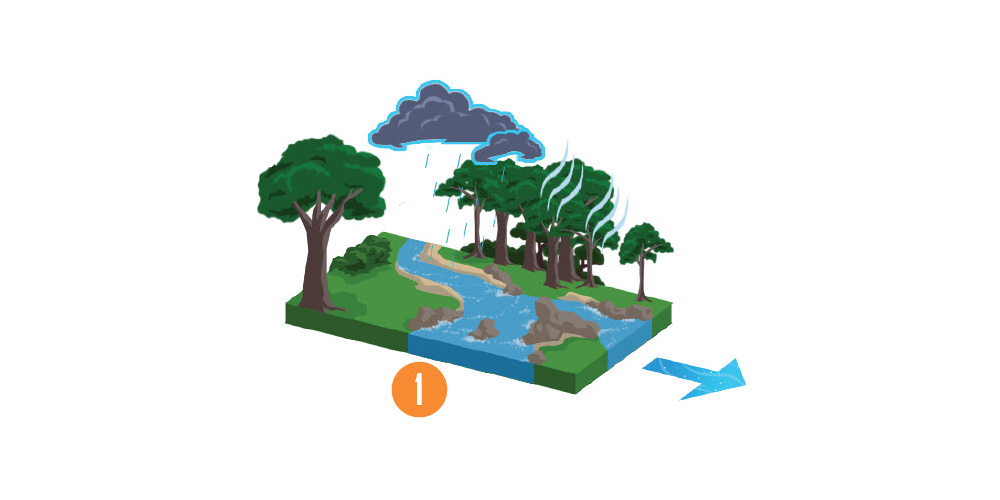Public Works and Environmental Services Alert:

Clean water is our most important resource. To keep water clean for future generations, we need to know where it comes from, how we use it, and where it goes after it leaves our homes and businesses. Learn how Fairfax County manages trees, forests, drinking water, wastewater, and stormwater runoff through separate systems. Find out where to get help and more information.
 Your drinking water might travel a long way before it gets to your tap. It comes into your house or building from either a public water service provider or a private well.
Your drinking water might travel a long way before it gets to your tap. It comes into your house or building from either a public water service provider or a private well.
Public Water Service: In Fairfax County, our drinking water comes from the Potomac and Occoquan Rivers. The water is cleaned at treatment plants and then piped to our homes and businesses. Clean water is used for drinking, cooking, cleaning, and plumbing.
For more information, contact these water suppliers:
Wells: In areas without public water service, private wells provide water. Groundwater is the largest source of fresh water, and it's vital to protect it. There are about 12,750 groundwater wells in Fairfax County that supply water for their owners.
For more information, visit the Health Department for Onsite Sewage Disposal and Private Well Water Systems.
 If you are connected to the public sewer system, water from sinks, showers, toilets, and appliances becomes wastewater. Wastewater is sent through over 3,300 miles of pipes before it is cleaned at treatment plants and released back into the environment.
If you are connected to the public sewer system, water from sinks, showers, toilets, and appliances becomes wastewater. Wastewater is sent through over 3,300 miles of pipes before it is cleaned at treatment plants and released back into the environment.
In areas without public sewer service, a septic system may be used. With approval from the Fairfax County Health Department, septic systems treat wastewater in an underground tank in your yard. This tank needs regular pumping to take the waste to treatment plants. Find out more about Onsite Sewage Disposal and Private Well Water Systems | Health Department.
After treatment, the water is released into local waterways or used for irrigation and industrial purposes. Sometimes treated water is diverted to a water reuse program for irrigation and industrial purposes. Visit Water Reuse.
 Stormwater is runoff from rainwater, melting snow and ice.
Stormwater is runoff from rainwater, melting snow and ice.
Everyone can help keep our water clean and protect the environment. Make sure only rain goes down the storm drain. Use less lawn fertilizer, pick up pet waste, and properly dispose of trash, paint, motor oil, and chemicals. Inside the home, avoid pouring fats, oils and grease down the drain, and never flush medicine down the toilet.
 Forests and trees naturally create clean water, and luckily over 50% of raindrops still land on trees in Fairfax County. We can improve water quality by protecting forest health and planting trees along our streets, in our yards, in our parks and next to our streams. Trees help by absorbing water and reducing pollution. Trees are so important to healthy water, they are protected through Resource Protection Areas (RPAs). Learn more about the benefits of trees by reading How Do Trees Benefit Me?
Forests and trees naturally create clean water, and luckily over 50% of raindrops still land on trees in Fairfax County. We can improve water quality by protecting forest health and planting trees along our streets, in our yards, in our parks and next to our streams. Trees help by absorbing water and reducing pollution. Trees are so important to healthy water, they are protected through Resource Protection Areas (RPAs). Learn more about the benefits of trees by reading How Do Trees Benefit Me?
Public Works strives to protect and enhance the natural environment, but we can’t do it alone. Volunteer to help keep our streets and streams clean and natural areas green. Working together, we can ensure Fairfax County remains a clean, safe, and healthy place to live, work, and play.
Through partnerships, stewardship, and education, the County works to use all resources wisely to protect and improve our natural environment and open space.
Chesapeake Bay Preservation Ordinance | Land Development Services
Watch the Green Grow | Park Authority
Water Quality Stewardship Guide | Northern Virginia Soil and Water Conservation District
Reporting problems is another way you can help protect our water.
| Topic | Contact Information |
|---|---|
| Urgent Sanitary Sewer or After-hours Flooding Problems | For urgent problems, call the 24-Hour Customer Communications Center (CCC): 703-323-1211 | TTY 711 |
| Street Flooding | Virginia Department of Transportation (VDOT) at 1-800-FOR-ROAD (1-800-367-7623), TTY 711, or use VDOT's Online Work Request Form. |
| Storm Drain Flooding, Stormwater Management Pond Problems | Contact Maintenance and Stormwater Management |
| Urban and Community Forestry, Hazardous Trees | Tree Resources - Who to Call | Public Works and Environmental Services |
| Stormwater: Please let us know if you see something questionable in a stream or lake. | Visit Stormwater Management Email the Stormwater Planning Division Call 703-324-5500, TTY 711 |
| Sanitary Sewers: Please let us know if you see something questionable or smell sewer odors. | Visit Wastewater Management Email the Wastewater Planning Division Call 703-324-5015, TTY 711 |
| Water Suppliers | Fairfax Water, 703-698-5600, TTY 711 Town of Vienna, 703-255-6385, TTY 711 |
| Private Well Water | Onsite Sewage Disposal and Private Well Water Systems | Health |
| Water Reuse Program | Visit Water Reuse |
